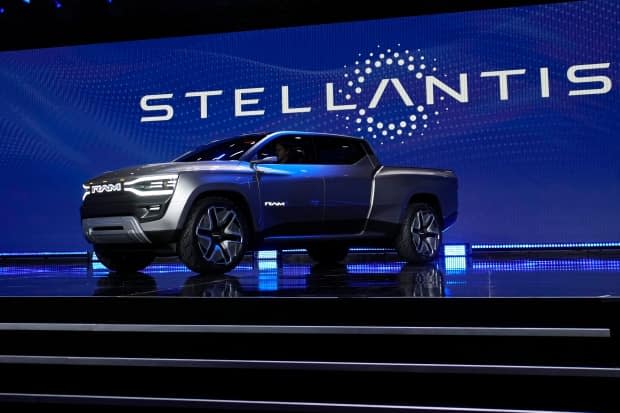Volkswagen to open first North American EV battery plant in St. Thomas, Ont.

The Ontario government has announced the planned construction of a Volkswagen electric vehicle (EV) battery manufacturing plant in St. Thomas, on Talbot Line near Yarmouth Centre Road, close to the city's airport.
The announcement, released Monday by the office of Vic Fedeli, the province's minister of economic development and trade, is the first public confirmation of the deal that has long been rumoured to be in the works.
The company said production is set to begin in 2027, calling it its first overseas "gigafactory" for battery cell manufacturing.
"I think that means a very large plant with a very large workforce," said St Thomas Mayor Joe Preston on Monday. "We're already clearing the land and getting things ready for as fast as a construction that we can do."
Preston said the plant will likely result in thousands of jobs, at the plant itself, along the supply chain and during the plant's construction, which is expected to take two to four years.
"In the long-run, it's maybe more than we can dream. It's that good for St Thomas."
Flavio Volpe, head of the Automotive Parts Manufacturers' Association (APMA), said the new plant could result in "as many as 2,500 direct jobs created and up to 7,500 total jobs including indirect positions."
The province recently passed legislation that would allow the City of St. Thomas to annex 607 hectares of farmland from the Municipality of Central Elgin. The aim is to turn the parcel into industrial lands as part of what the province called an investment "mega-site."
Neighbours were upset by the legislation, which they said was done in secret and without their consultation.
Preston said it's typical for governments to keep real estate deals confidential until they're a fait accompli.
"Obviously any negotiation on property or land purchases needs to be done quietly. We certainly don't put up billboards about it," he said.
Volkswagen officials met with Premier Doug Ford on Feb 23, according to a provincial news release to seal the deal.
Batteries at the plant, once built, would be manufactured by PowerCo, a Volkswagen subsidiary in its first overseas battery manufacturing plant.
'A vote of confidence' for Ontario manufacturing
Brendan Sweeney is managing director of the Trillium Netowrk for Advanced Manufacing at Western University in London, Ont.
Sweeney said the new EV battery manufacturing plant "really is a vote of confidence in Ontario as a location for manufacturing and particularly southwestern Ontario, especially given that this is not an incumbent manufacturer making a new investment — this is a manufacturer that is quite new to Canada."
Sweeney said that by the time the plant is built, it will likely feed at least three other EV manufacturing plants in North America, including a yet-to-be-built EV plant in the Carolinas and a not-yet announced Audi plant, the location of which is still to be determined.

Given all that, Sweeney said, the plant could be as big, if not bigger, than the recently announced Stellantis EV battery plant in Windsor, which will employ 2,500 workers.
"This could be as big or bigger," he said. "It's very exciting."
Sweeney said the announcement means St. Thomas will likely see a large amount of growth in the form of new housing and more suppliers in order to serve the new plant.
He said part of the reason Volkswagen may have chosen the St. Thomas site is because of recent layoffs at the CAMI Assembly plant in Ingersoll and the Brose auto-parts manufacturing plant in London, as well as the recent closure of the Johnson Controls International plant in Tillsonburg.
"That, in an odd way, is likely one of the reasons this [Volkswagen EV] plant landed where it did. There's an available workforce that knows the auto industry very well.
"Those layoffs, in such a tight labour market, might have made Volkswagen say, 'Oh, there's people available,'" Sweeney said. "The quality of the workforce in the region is probably a big draw."
Provincial officials and company officials from Volkswagen were not immediately available for comment Monday.

